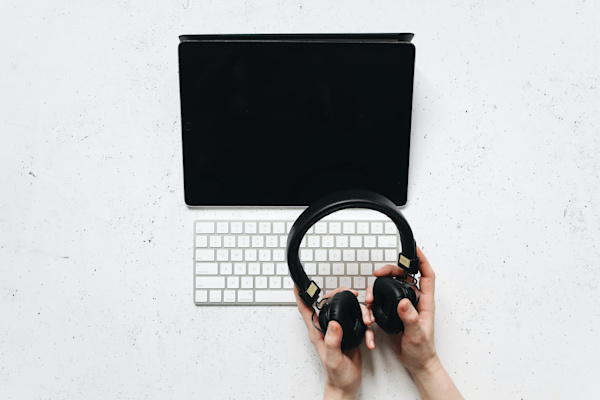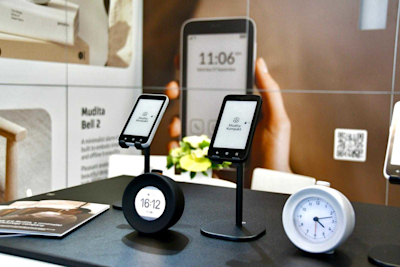
The downsides of digital technology
Unraveling the Downsides and Embracing Mindful Use
The digital age we all live in is undeniably impressive; the seamless integration of technology into our lives has empowered us in so many ways, from having the ability to communicate instantly across the globe, to accessing vast information resources at our fingertips. However, every coin has two sides, and it's essential to recognize the potential downsides of digital technology.
At Mudita, we’re all about engaging with the world in a mindful way, which means we're also committed to raising awareness of the potential downsides of digital technology. We love technology as much as anyone, but we also know how easy it can take over our lives and upend the human experience. That’s why it’s important to keep things in perspective.
In this pursuit of awareness, we can foster a balanced and more mindful relationship with the tech world, taking advantage of its benefits while mitigating its pitfalls.
The Silent Wave of Social Isolation
With the proliferation of digital technology, we find ourselves spending more time with screens than with people. As we endlessly scroll through social media feeds or become engrossed in the latest viral video, our actual face-to-face human interaction is dwindling. This shift can inadvertently lead to feelings of social isolation and loneliness, subtly eroding our inherent need for real-world connection and community. Studies have shown that prolonged loneliness can impact our mental health significantly, leading to conditions like depression and anxiety.[1][2][3][4]
Digital Addiction: An Emerging Epidemic
Addiction is not a term solely reserved for substances; it can also aptly describe our relationship with digital technology. The constant stimulation from social media feeds, online games, and other digital platforms can create a sense of compulsion to stay connected, making us neglect crucial aspects of our lives such as relationships, work, or even self-care. It's a 21st-century challenge that needs addressing for a balanced life.[5]
Cyberbullying: The Dark Underbelly of the Internet
The relative anonymity offered by the internet can sometimes bring out the worst in people. Cyberbullying is a severe concern, where individuals can face incessant harassment, threats, and humiliation online. The consequences are not limited to the digital realm; they manifest in real-life emotional distress and even contribute to severe mental health issues. This digital downside emphasizes the need for robust online safety and empathy education. [6]
Disinformation: The False Prophets of the Digital Age
With digital technology, anyone can be a publisher of information. However, this freedom often results in the spread of false or misleading information, leading to widespread confusion, distrust, and potential harm. The fake news phenomenon, amplified by the interconnectedness of social media, can distort public perception and influence critical decisions, underscoring the importance of digital literacy and critical thinking. In fact, research by three MIT scholars has found that false news spreads more rapidly on the social network Twitter than real news does. [7][8]
Privacy Concerns: The Invisible Trade-off
In our digital interactions, every click, like, and share paints a picture of our preferences, behaviors, and lifestyles. This data, often collected and shared without explicit consent, raises severe privacy concerns. Balancing the conveniences offered by personalized experiences with the safeguarding of our personal information is a pressing challenge in the digital age.
Job Displacement: The Double-Edged Sword of Progress
The automation capabilities of digital technology have revolutionized many industries, leading to unprecedented productivity and efficiency. However, this shift has also led to job displacement in sectors like manufacturing and retail, fueling economic and social concerns. The onus is on policymakers and businesses alike to address this issue through reskilling initiatives and thoughtful digital transformation strategies. [9][10]
Physical Health Challenges: The Sedentary Side-Effect
Digital technology, while enabling many conveniences, can encourage a sedentary lifestyle. Prolonged screen time and lack of physical activity can contribute to health problems such as obesity, heart diseases, and poor posture, to name a few. Therefore, incorporating healthy practices, like regular exercise and screen breaks, becomes imperative in our digital-centric lives. [11]
Embracing Balance: The Path to Mindful Tech Use
Despite these downsides, it is important to remember that technology is a tool, and like any tool, its impact depends on how we use it. Acknowledging these potential pitfalls is not a call to abandon technology but an invitation to engage with it more mindfully.
Promoting digital literacy, advocating for privacy reforms, and supporting mental health initiatives can help us combat many of these issues. Equally important is fostering healthy digital habits—taking regular breaks from screens, setting boundaries for online interactions, and ensuring we have quality offline time.
By embracing a balanced approach to digital technology, we can harness its benefits while minimizing the negative impacts. After all, the goal is not to disconnect entirely but to connect more authentically, both with the digital world and the world that breathes beyond the screen.
As we navigate this digital landscape, remember that it's not about rejecting technology, but about finding balance. Our digital devices are not villains, but tools that can enrich our lives when used thoughtfully and intentionally. So, let's continue to leverage the wonders of digital technology, but with an added layer of mindfulness, compassion, and awareness. With this balanced approach, we can shape a healthier, happier digital future for all.
Related stories

Is Short-Form Video Hurting Your Focus?
New research shows short-form video may weaken attention. Explore how mindful tools and Mudita Kompakt support healthier digital habits.

Mudita Kompakt & Mindful Tech Shine at IFA Berlin 2025
At IFA Berlin 2025, Mudita Kompakt and our mindful tech products drew attention for offering calm, minimalist alternatives to digital overload.

It’s official! Kompakt is now shipping to North American Backers
The North America Optimized Mudita Kompakt, our minimalist phone designed for mindful living, is now shipping. See what to expect and how to track your order.
If you'd like to receive the best stories from our blog, keep up to date with our progress and get notified about our product releases and special discounts.